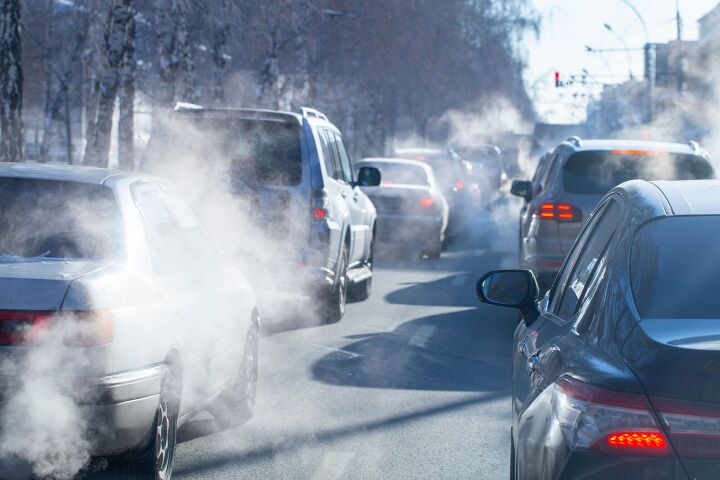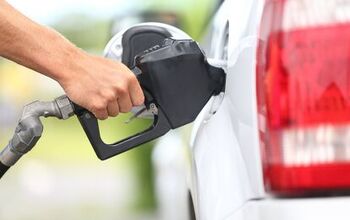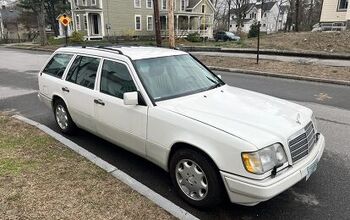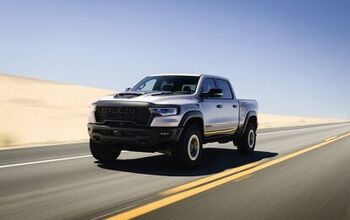Opinion: Politicians Are Lying About Biden's EPA Rule

The Biden Administration dropped a new rule limiting tailpipe emissions from passenger vehicles yesterday, and you know what that means.
Yes, it's lying season!
I want to focus on one particular egregious lie. You will soon see arguments from certain anti-EV types that new rule is an EV mandate. It very much is not.
First, some background from the New York Times:
The rule increasingly limits the amount of pollution allowed from tailpipes over time so that, by 2032, more than half the new cars sold in the United States would most likely be zero-emissions vehicles in order for carmakers to meet the standards.
We can argue all day long about whether the rule is too stringent or not, or whether automakers will be able to achieve the administration's goals. But as the Times points out, the government is NOT forcing the fleet to become all electric:
The E.P.A. regulation is not a ban. It does not mandate the sales of electric vehicles, and gas-powered cars and trucks could still be sold. Rather, it requires carmakers to meet tough new average emissions limits across their entire product line. It’s up to the manufacturers to decide how to comply.
That hasn't stopped the American Fuel & Petrochemical Manufacturers lobbying arm from calling the rule "Biden's EPA car ban." This is where I credit the oft-beleaguered Times, which I have hit at here and there, for not pulling punches and calling that assertion false.
It's not a ban on cars or internal-combustion engine cars. It's just not. And don't let those who have an anti-EV agenda lie to you.
Conversely, don't let the other side oversell things -- while reducing tailpipe emissions is a necessary step forward in fighting the negative effects of climate change, the production of the materials needed for electric and electrified vehicles has its own environmental toll.
It should also go without saying that the government's claims are estimates and the real-world effects of this rule won't be something we can measure just yet.
Now, if you want to argue that the new rule is effectively a mandate since it would likely force automakers to produce more battery-electric vehicles (or fuel-cell vehicles that use hydrogen to produce electric energy/power), that's fair. But I'd push back by suggesting that automakers will still be able to produce ICE vehicles under the new rule. Just, perhaps, fewer of them.
That said, consumers will still have their choice of vehicle type under the new rule. So, again, when someone claims this is a ban, they are either wrong or lying. Or both.
Again, from the NYT:
Under the Clean Air Act, the agency can limit the pollution generated by the total number of cars sold each year. E.P.A. officials said automakers could comply with the emissions caps by selling a mix of conventional gasoline-burning cars, hybrids, electric vehicles or other types of vehicles, such as cars powered by hydrogen. The new regulation, which would not apply to sales of used automobiles or light trucks, would take effect starting with model year 2027.
Car companies that exceed the new restrictions could face substantial penalties.
So this means that consumers will not necessarily be forced into pure BEVs -- ICE and hybrid vehicles will almost certainly remain available, at least for the foreseeable future.
Even the automaker's lobbying group seems to be onboard here, which is often not the case. Once more, take it away New York Times:
John Bozzella, president of the Alliance for Automotive Innovation, which represents 42 car companies that produce nearly all the new vehicles sold in the United States, said in a statement that the new rule was “a stretch goal” but one that offered some flexibility. “The future is electric,” he said. Still, the rules “are mindful of the importance of choice to drivers and preserve their ability to choose the vehicle that’s right for them,” he said.
When even the automakers, who often fight regulation like I fought bedtime as a child and who also generally lobby on behalf of consumer choice so they can sell what the public wants (and spend less on compliance), aren't whining too much, maybe the new rule isn't going to actually ban ICE cars and stifle the ability of buyers to choose?
That hasn't stopped grandstanding politicians from saying bull dung like this statement in the Times piece:
“They may wish for us all to drive E.V.s or no cars at all, but at the end of the day that’s not their decision,” said Elizabeth Murrill, the attorney general of Louisiana, a major oil and gas producing state that has been involved in a series of lawsuits challenging the Biden E.P.A. “There is a limit to their authority to remake society in their own vision and the court has realized that.”
This author has realized that you, Elizabeth Murrill, are lying about this being a mandate by framing it as a false choice. The Biden administration and EPA are NOT BANNING NON-ELECTRIC CARS.
I get fired up about this kind of stuff not because I approve of the rule -- I honestly haven't given thought to whether it will be effective or not, and any opinion/analysis discussion about it is best set aside for a separate article -- but because I am tired of self-interested politicians blatantly lying to our faces. Not spinning or shading the truth, but lying in the face of direct, contradictory evidence.
Yes all sides do it, though one side is more guilty than others over the past nine years, but this isn't a left/right thing. It's an intellectual honesty thing. Instead of lying that this new rule is a ban on ICE cars, why can't opponents argue it on the merits?
There are fair arguments to be made against the rule. Perhaps the cost of compliance will drive the cost of cars up. Perhaps this rule will force automakers to pump out EVs faster than charging infrastructure can keep up. Perhaps the government's claims about the environmental impact are too optimistic and complying with the new rule won't be effective in the fight against man-made climate change.
That's just three I thought of off the top of my head as I typed -- I am sure there are others.
Unfortunately, big money from gas and oil is behind certain politicians -- and, as our Louisiana example shows, some states make big money off of oil and gas production and would rather not see that jeopardized. It's also easy to scare the electorate by screaming that the government will take away your choice to buy whatever vehicle you want or need. Even a lot of folks on the left side of the political aisle are susceptible to fear-mongering based on lies.
Fear is effective. Not just on this issue -- think about how "tough on crime" politicians on both sides of the aisle often sway fearful voters even when statistics show crime in their area is low.
Perhaps I am just tired of being gaslit -- or as my dad sometime says, "don't pee in my face and tell me it's raining" (though he doesn't say "pee" exactly). If you are a politician, automaker, Big Oil lobbyist, or regular person who thinks the rule is bad for the auto industry and/or consumers, argue on the merits. Don't lie and claim it is something it is not.
To borrow another urological metaphor, I realize I am urinating into the wind when I ask powerful interests to not abandon the truth when arguing for their interests, but please, please, please: STOP LYING.
Soapbox, off.
[Image: NadyGinzburg/Shutterstock.com]
Become a TTAC insider. Get the latest news, features, TTAC takes, and everything else that gets to the truth about cars first by subscribing to our newsletter.

Tim Healey grew up around the auto-parts business and has always had a love for cars — his parents joke his first word was “‘Vette”. Despite this, he wanted to pursue a career in sports writing but he ended up falling semi-accidentally into the automotive-journalism industry, first at Consumer Guide Automotive and later at Web2Carz.com. He also worked as an industry analyst at Mintel Group and freelanced for About.com, CarFax, Vehix.com, High Gear Media, Torque News, FutureCar.com, Cars.com, among others, and of course Vertical Scope sites such as AutoGuide.com, Off-Road.com, and HybridCars.com. He’s an urbanite and as such, doesn’t need a daily driver, but if he had one, it would be compact, sporty, and have a manual transmission.
More by Tim Healey
Latest Car Reviews
Read moreLatest Product Reviews
Read moreRecent Comments
- Steve S. Steve was a car guy. In his younger years he owned a couple of European cars that drained his bank account but looked great and were fun to drive while doing it. This was not a problem when he was working at a good paying job at an aerospace company that supplied the likes of Boeing and Lockheed-Martin, but after he was laid off he had to work a number of crummy temp jobs in order to keep paying the rent, and after his high-mileage BMW was totaled in an accident, he took the insurance payout and decided to get something a little less high maintenance. But what to get? A Volkswagen? Maybe a Volvo? No, he knew that the parts for those were just as expensive and they had the same reputation for spending a lot of time in the shop as any other European make. Steve was sick and tired of driving down that road."Just give me four wheels and a seat," said Steve to himself. "I'll buy something cooler later when my work situation improves".His insurance company was about to stop paying for the rental car he was driving, so he had to make a decision in a hurry. He was not really a fan of domestics but he knew that they were generally reliable and were cheap to fix when they did break, so he decided to go to the nearest dealership and throw a dart at something.On the lot was a two year old Pontiac Sunfire. It had 38,000 miles on it and was clean inside and out. It looked reasonably sporty, and Steve knew that GM had been producing the J-car for so long that they pretty much worked the bugs out of it. After taking a test drive and deciding that the Ecotec engine made adequate power he made a deal. The insurance check paid for about half of it, and he financed the rest at a decent rate which he paid off within a year.Steve's luck took a turn for the better when he was offered a job working for the federal government. It had been months since he went on the government jobs website and threw darts at job listings, so he was surprised at the offer. It was far from his dream job, and it didn't pay a lot, but it was stable and had good benefits. It was the "four wheels and a seat" of jobs. "I can do this temporarily while I find a better job", he told himself.But the year 2007 saw the worst economic crash since the Great Depression. Millions of people were losing their jobs, the housing market was in a free fall, people were declaring bankruptcy left and right, and the temporary job began to look more and more permanent. Steve didn't like his job, and he hated his supervisors, but he considered himself lucky that he was working when so many people were not. And the federal government didn't lay people off.So he settled in for the long haul. That meant keeping the Sunfire. He didn't enjoy it, but he didn't hate it either, and it did everything he asked of it without complaint.Eventually he found a way to tolerate his job too, and he built seniority while paying off his debts. There was a certain feeling of comfort and satisfaction of being debt-free, and he even began to build some savings, which was increasingly important for someone now in their forties.Another bit of luck came a few years later when Steve's landlord decided to sell the house Steve was renting, at the bottom of the housing market, and offered it to Steve for what he had in it. Steve's house was small and cramped, and he didn't really like it, but thanks to his savings and good credit he became a homeowner in an up and coming neighborhood.Fourteen years later Steve was still working that temporary job, still living in that cramped little house that he now hated, and still drove the Sunfire because it wouldn't die. For years now he dreamed of making a change, but then the pandemic happened and threw the economy and life in general into chaos. Steve weathered the pandemic, kept his job when millions of people were losing theirs, and sheltered in place in that crummy little house, with Netflix, HBO, and a dozen other streaming services keeping him company, and drove to and from work in the Sunfire because it was four wheels and a seat and that's all he needed for now.Steve's life was secure, but a kind of dullness had set in. He existed, but the fire went out; even when the pandemic ended and life returned to normal Steve's life went on as it had for years; an endless Groundhog Day of work, home, work, home. He never got his real-estate license or finished college and got his bachelor's, never got a better job, never used his passport to do some traveling in Europe. He lost interest in cars. "To think how much money I wasted on hot cars when I was younger", he said to himself. He never married and lost interest in dating. "No woman would want me anyway. I've gotten so dull and uninteresting that I even bore myself".Eventually the Sunfire began to give trouble. With 200,000 miles on the clock it was leaking oil, developing electrical gremlins, and wallow around on blown-out shocks. Steve wasn't hurting for money and thought about treating himself to a new car. "A BMW 3-series, maybe. Or maybe an Alfa Romeo Giulia!" He began to peruse the listings on Autotrader. "Maybe this is just what I need to pull out of this funk. Put a little fun back in my life. Yeah, and maybe go back to the gym, and who knows, start dating again and do some traveling while I'm still young enough to enjoy it!"Then his father passed away and left him a low-mileage Ford. Steve didn't like it or hate it, but it was four wheels and a seat, and that's all he needed right now."Is it too late to have a mid-life crisis?" Steve thought to himself. For what he needed more than that stable job, that house with an enviably small mortgage payment, and that reliable car was a good kick in the hindquarters. "What the hell am I afraid of? I should be afraid that things will never change!"But the depression was like a drug, a numbness that they call "dysthymia"; where you're neither here or there, alive or dead, happy or sad. It was a persistent overcast, a low ceiling that kept him grounded. The Sunfire sat in his driveway getting buried by the needles from his neighbor's overhanging pine trees which were planted right on the property line. "Those f---ing pine trees! That's another thing I hate about this damn house!" Eventually the Sunfire wouldn't start. "I don't blame you", he said to the car as he trudged past it to drive the Ford to another Groundhog Day at that miserable job.
- Yuda Cool. Cept we need oil and such products. Not just for fuel but other stuff as well. The world isn't exactly ready to move to wind and solar and whatever other bs, the technology simply isn't here yetNot to mention it's too friggin expensive, the equipment is still too niche and expensive as it stands
- Rna65689660 Picked up my wife’s 2024 Bronco Sport Bad Lands!
- Inside Looking Out Android too.
- Ajla I'm replacing the transmission in a 2006 GMC van.


































Comments
Join the conversation
Sure. When two thirds have to be electric, everyone will have their choice of a gas car. Just like they can keep their health insurance.
Shill.
The bottom line is that in the new America coming the elites don't want you and me to own cars. They are going to make building cars so expensive that the will only be for the very rich and connected. You will eat bugs and ride the bus and live in a 500sq-ft. apartment and like it. HUD wants to quit giving federal for any development for single family homes and don't be surprised that FHA aren't going to give loans for single family homes in the very near future.